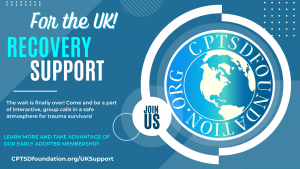Complex post-traumatic stress disorder (CPTSD) on its own is a severe diagnosis. However, when paired with another significant diagnosis, such as borderline personality disorder (BPD), the two diagnoses deeply affect people’s lives.
In this article, we shall examine CPTSD and BPD and their effects on the people who have both.
What is Complex Post-Traumatic Stress Disorder?
 CPTSD is created when people (especially children) experience ongoing and inescapable domestic abuse, such as sexual abuse or neglect. The trauma of abuse and neglect leaves life-long scars leaving the affected person struggling to form and keep intimate relationships.
CPTSD is created when people (especially children) experience ongoing and inescapable domestic abuse, such as sexual abuse or neglect. The trauma of abuse and neglect leaves life-long scars leaving the affected person struggling to form and keep intimate relationships.
According to the Substance Abuse and Mental Health Services Administration (SAMSHA), 70% of adults in the United States have experienced at least one traumatic incident in their lifetime. This exposure to violence, whether committed against the child or seeing it done to someone else, causes children to grow up having complex post-traumatic stress disorder.
Complex PTSD differs from post-traumatic stress disorder (PTSD) as CPTSD has some indications of PTSD yet different symptoms, such as the following.
- Reliving the trauma through flashbacks and nightmares
- Avoiding situations that remind them of the trauma
- Dizziness or nausea when remembering the trauma
- Hyperarousal
- The belief that the world is a dangerous place
- A loss of trust in the self or others
- Difficulty sleeping or concentrating
- Startling easy by loud noises
- A negative self-view
- Emotional regulation difficulties
- Problems with relationships
- Thoughts or actions of suicide
- Fixating on the abuser or seeking revenge
- Losing memories of trauma or reliving them
- Difficulty regulating emotions that often manifest as rage
- Depression
- Sudden mood swings
- Feeling detached from oneself
- Feeling different from others
- Feeling ashamed
- Feeling guilty
- Difficulty maintaining relationships
- Seeking our or becoming a rescuer
- Feeling afraid for no apparent reason
People struggling with complex post-traumatic stress disorder often experience isolation to cope with the overwhelming sense of unsafety.
Complex post-traumatic stress disorder is not yet recognized in the Diagnostic and Statistical Manual of Mental Disorders edition 5-TR (DSM-5-TR) but is receiving more recognition and acceptance lately.
What is Borderline Personality Disorder?

Borderline personality disorder (BPD) is a crucial mental health disorder that severely impacts the person living with it to regulate emotions. The loss of emotional control increases impulsivity and affects how people feel about themselves, and significantly negatively affects their relationships with others.
An estimated 1.4% of adults living in the United States experience BPD, with 75% being diagnosed with the disorder being women. Research suggests that men might be just as affected by BPD as women but are misdiagnosed with PTSD or depression.
Borderline personality disorder causes are not well understood. However, scientists agree that it results from a combination of genetic, environmental, and neurological factors.
The symptoms of BPD are as follows.
- Frantic efforts to avoid abandonment, whether it is accurate or not, by family and friends
- Unstable intimate relationships
- Unstable and distorted self-image that affects values, opinions, moods, goals, and relationships
- Impulsive behavior often with dangerous outcomes
- Self-harming behaviors
- Periods of severe depression, irritability, and anxiety
- Chronic feelings of emptiness and boredom
- Intense, inappropriate-of-control anger followed by shame and guilt
- Dissociative episodes
Borderline personality disorder, like CPTSD, is life-altering and often has severe consequences on the person’s life.
What are the differences between BPD and CPTSD?
 There are several differences between the diagnoses of complex post-traumatic stress disorder and borderline personality disorder, including, as seen above, the symptoms and, as we shall learn, the causes.
There are several differences between the diagnoses of complex post-traumatic stress disorder and borderline personality disorder, including, as seen above, the symptoms and, as we shall learn, the causes.
Complex post-traumatic stress disorder causes are distinct and include the following.
- Frequently witnessing violence or abuse
- Domestic assault and abuse
- Abandonment or maltreatment during childhood
- Ongoing domestic violence or abuse
As stated above, the causes of borderline personality disorder are thought to be a mixture of genetics, neurological problems, and trauma.
Many times, clinicians will get the two diagnoses mixed up and diagnose complex post-traumatic stress disorder as borderline personality disorder.
Coexisting CPTSD and BPD
At one-time, complex post-traumatic stress disorder was proposed as an alternate form of borderline personality disorder because of the shared link to severe childhood trauma. The jury is still out to recognize CPTSD as a diagnosis in the DSM, but it is believed that the symptoms and causes of BPD and CPTSD overlap substantially, but it is not warranted to replace one diagnosis with the other or conceptualize CPTSD as a subtype of BPD.
Borderline personality disorder and complex post-traumatic stress disorder are commonly found together, with between 25% and 60% of people living with BPD also having CPTSD.
Complex post-traumatic stress disorder is listed in the 11th edition of the International Classification of Diseases (ICD-11), and this has spurred research differentiating the two disorders.
Evidence suggests that CPTSD and BPD may represent a continuum of the stress response, and both seem to have a component of dissociation involved. The most significant difference between the two diagnoses is when they form. CPTSD typically forms in early childhood, while BPD forms during early adolescence.
Having both CPTSD and BPD makes life difficult, to say the least.
Ending Our Time Together
Whether you are diagnosed with CPTSD or BPD, the common thread seems to be trauma. The only way to end the tragedy of these two life-disrupting diagnoses is to end childhood trauma. Doing so would change the outlook for multiple millions of people worldwide. Ending child abuse is difficult as it is often committed by a close family member or friend and is hidden for years but we must keep trying.
If you find you are struggling with cooccurring diagnoses of complex post-traumatic stress disorder and borderline personality disorder, it is not the end of the world. Your diagnoses do not make you broken and irreparable; medications and therapy can go a long way toward you having a good life. It takes a lot of work and determination to do so, but you can do it.
“Attitude is a choice. Happiness is a choice. Optimism is a choice. Kindness is a choice. Giving is a choice. Respect is a choice. Whatever choice you make makes you. Choose wisely.” – Roy T. Bennett
“It’s only after you’ve stepped outside your comfort zone that you begin to change, grow, and transform.” – Roy T. Bennett


UK Recovery Support

Are you a therapist who treats CPTSD? Please consider dropping us a line to add you to our growing list of providers. You would get aid in finding clients and helping someone find the peace they deserve. Go to the contact us page and send a note; our staff will respond quickly.
Shortly, CPTSD Foundation will have compiled a list of providers treating complex post-traumatic stress disorder. When it becomes available, we will put it on our website www.CPTSDFoundation.org.
Visit us and sign up for our weekly newsletter to help inform you about treatment options and much more for complex post-traumatic stress disorder.
The Healing Book Club

As of May 7th, 2022, the current book will be – “A Practical Guide to Complex PTSD: Compassionate Strategies to Begin Healing from Childhood Trauma.”
by Dr. Arielle Schwartz.
Here is an Excerpt –
Repetitive trauma during childhood can impact your emotional development, creating a ripple effect that carries into adulthood. Complex post-traumatic stress disorder (C-PTSD) is a physical and psychological response to these repeated traumatic events. A Practical Guide to Complex PTSD contains research-based strategies, tools, and support for individuals working to heal from their childhood trauma. You don’t have to be a prisoner of your past.
Learn the skills necessary to improve your physical and mental health with practical strategies taken from the most effective therapeutic methods, including cognitive-behavioral therapy (CBT), dialectical behavioral therapy (DBT), eye movement desensitization, and reprocessing (EMDR), and somatic psychology. When appropriately addressed, the wounds of your past no longer need to interfere with your ability to live a meaningful and satisfying life.
This book includes:
- Understand C-PTSD—Get an in-depth explanation of complex PTSD, including its symptoms, its treatment through various therapies, and more.
- Address the symptoms—Discover evidence-based strategies for healing the symptoms of complex PTSD, like avoidance, depression, emotional dysregulation, and hopelessness.
- Real stories—Relate to others’ experiences with complex PTSD with multiple real-life examples in each chapter.
Start letting go of the pain from your past—A Practical Guide to Complex PTSD can help show you how.
If you or a loved one live in the despair and isolation of complex post-traumatic stress disorder, please come to us for help. CPTSD Foundation offers a wide range of services, including:
- Daily Calls
- The Healing Book Club
- Support Groups
- Our Blog
- The Trauma-Informed Newsletter
- Daily Encouragement Texts
All our services are reasonably priced, and some are even free. So, sign-up to gain more insight into how complex post-traumatic stress disorder is altering your life and how you can overcome it; we will be glad to help you. If you cannot afford to pay, go to www.cptsdfoundation.org/scholarship to apply for aid. We only wish to serve you.
Mindfulness, Prayer, and Meditation Circle

Meditation can be an integral part of healing from trauma. Our 9-week self-study video course helps you integrate this fantastic grounding, centering, and focus method. Join the Mindfulness, Prayer, and Meditation Circle today!
A new Trauma-Informed Yoga program is now available! Check out our information page about this highly requested new program! #yoga #traumainformed #cptsd #mentalhealth #recovery #wellness https://cptsdfoundation.org/traumainformedyoga/
Do you have goals you need help reach, or help define what goals suit you? Have you considered working with a #traumainformed coach? Learn about a new opportunity and a Free Discovery Call!

My name is Shirley Davis and I am a freelance writer with over 40-years- experience writing short stories and poetry. Living as I do among the corn and bean fields of Illinois (USA), working from home using the Internet has become the best way to communicate with the world. My interests are wide and varied. I love any kind of science and read several research papers per week to satisfy my curiosity. I have earned an Associate Degree in Psychology and enjoy writing books on the subjects that most interest me.




Another great contribution Shirley. From what I recall Prof Anne Carson, a psychiatrist and around 1993 took up the cause of campaigning for a dignified approach to the treatment of women abuse survivors. She paved the way for the identification of the counter transference as the means by which to differentiate treatment outcomes for women being detained in hospital, as much for patient management problems, but being diagnosed and treated for schizophrenia. Her contribution to both DSM and ICD facilitating the separation of a diagnosis of simple schizophrenia for, largely, women survivors. Her work does though seem to be unacknowledged.
I need clinical help with these triggers
Most people do. They find they cannot control their reactions when a trigger happens. It’s okay to get help. Shirley
I have CPTSD and BPD. I have been diagnosed by my psychiatrist. I have weekly sessions with my therapist.
I have cptsd & eupd, therapy hasn’t helped at all, talking about things doesn’t stop the flashbacks, memories, feelings